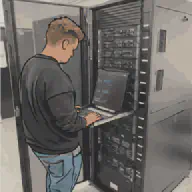Introduction#
In this article, I will present all the errors I encountered while trying to install Veeam CDP I/O Filters on ESXi 6.5 and 6.7 servers.
Environment Tested#
Test 1:
- ESXi version: 6.7 U3
- vCenter version: 7.0.3 Test 2:
- ESXi version: 6.5
- vCenter version: 6.5
Useful Commands & Logs for Debugging Veeam CDP Issues#
Before diagnosing specific problems, here are essential commands and log paths you can use to gather useful information from vCenter and ESXi hosts when troubleshooting Veeam CDP or I/O Filter installation issues.
On vCenter Server (VCSA)#
View General vCenter System Logs#
tail -f /var/log/vmware/vpxd/vpxd.log
Useful for vCenter tasks like plugin interactions, connection issues, or DNS errors.
View Veeam/Storage Provider Logs bash Copy Edit#
tail -f /var/log/vmware/vmware-sps/sps.log
On ESXi Hosts#
View Host DNS Resolution (Test from ESXi)#
ping vcenter.example.local
ping VEEAM-HOSTNAME
Issue Number 1 : Operation is not allowed in the current state#
This is the most common issue and is almost always related to DNS resolution problems.
Requirements:#
- The Veeam server must be able to resolve the vCenter FQDN and all ESXi hostnames (FQDN).
- All ESXi hosts must be able to resolve the vCenter FQDN and the Veeam server’s hostname (Windows short hostname).
Solutions#
The best method is to SSH into each ESXi host and add the necessary entries to the /etc/hosts file:
x.x.x.x vcenter.example.local
x.x.x.x VEEAM-HOSTNAME
Issue Number 2 : Trusted chain error#
This issue is usually caused by a certificate signing problem with older ESXi 6.x versions. See VMware/Broadcom documentation : https://knowledge.broadcom.com/external/article?legacyId=76555
Veeam error :#
30/07/2025 7:34:20 PM Agent VIB module is not installed.
Cause : <error errorClass="InstallationError">
<errorCode>15</errorCode>
<errorDesc>The installation transaction failed.</errorDesc>
<vibs>VEE_bootbank_veecdp_12.0.391-1OEM.650.0.0.4598673</vibs>
<msg>('VEE_bootbank_veecdp_12.0.391-1OEM.650.0.0.4598673', 'Could not find a trusted signer: unable to get local issuer certificate')</msg>
</error>
vCenter error :#
Could not stage image profile '(Updated) ESXi-6.7.0-20191204001-standard': ('VEE_bootbank_veecdp_12.0.391-1OEM.650.0.0.4598673', "('VEE_bootbank_veecdp_12.0.391-1OEM.650.0.0.4598673', 'Could not find a trusted signer: unable to get local issuer certificate')")
Solutions : Manual VIB Installation on ESXi Hosts#
You must manually install the VIB on all ESXi hosts in the CDP-enabled cluster.
Once installed manually, retry the I/O filter installation from Veeam. It will detect that the filter is already present and complete the process successfully.
Step-by-step:#
1. Locate the VIB files on the Veeam server: #
On the Veeam backup server, in the following directory by default:
C:\Program Files\Veeam\Backup and Replication\Backup\Packages
Look for files starting with veecdp-offline-bundle:`
veecdp-offline-bundle– for ESXi 6veecdp-offline-bundle.7.0.0– for ESXi 7veecdp-offline-bundle.8.0.0– for ESXi 8
Copy the appropriate bundle to each ESXi host in the cluster.
2. Install the VIB via esxcli command line:#
SSH into each ESXi host in the cluster and install this VIB using the following command:
esxcli software vib install -d <path to the veecdp file> --no-sig-check
The –no-sig-check tells ESXi to ignore the signature check, which is what is causing the issue with the install from Veeam
3. Rescan and Synchronize Storage Providers in vCenter:#
It is recommended to rescan and synchronize storage providers from vCenter.
- Log into vSphere → navigate to Inventory
- Click on vCenter Server (usually at the top of the navigation tree)
- Go to Configure → Storage Providers
- Choose to Synchronize Storage Providers
- Select each ESXi host and choose Rescan

4. Retry the I/O Filter Installation in Veeam:#
Return to Veeam and attempt the I/O filter install again. During the install process, it should see the I/O filter already installed and up-to-date. Continuing the installation wizard should allow the install process to successfully complete.
Issue Number 3 : Storage providers offline#
In the vCenter log: /var/log/vmware/vmware-sps/sps.log you will see entries similar to the below
`[YYYY-MM-DDTHH:MM:SS] [pool-10-thread-5] ERROR opId=sps-Main-101761-246 com.vmware.vim.sms.provider.vasa.alarm.AlarmDispatcher -`
`[YYYY-MM-DDTHH:MM:SS] [pool-10-thread-1] ERROR opId=sps-Main-101761-246 com.vmware.vim.sms.provider.vasa. alarm. AlarmDispatcher - Error: org.apache.axis2.AxisFault: self signed certificate occured as provider: https://<ESXi-A FQDN>:9080/version.xml:9080/version.xml is`
`offline`
`[YYYY-MM-DDTHH:MM:SS] [pool-10-thread-4] ERROR opId=sps-Main-101761-246 com.vmware.vim.sms.provider.vasa.alarm.AlarmDispatcher - Error: org.apache.axis2.AxisFault: self signed certificate occured as provider: https://<ESXi-C FQDN>:9080/version.xml:9080/version.xml is`
`offline`
- Open PowerCLI
- Connect PowerCLI to the vCenter Server:
Connect-VIServer --server <vCenter-FQDN>
- Run the following command to remove offline IOfilters:
Get-VasaProvider | Where-Object {$_.Namespace -eq 'IOFILTERS' -and $_.Status -like 'offline'} | Remove-VasaProvider
- In vSphere Client, go to vCenter > Configure > Storage Providers.
- Click on “Synchronize Storage Providers”.

